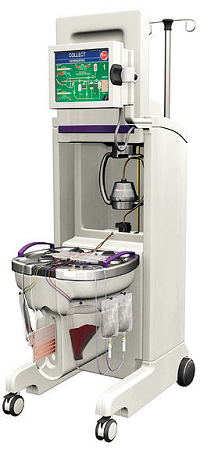 |
| Therakos' Cellex Photopheresis System--Courtesy of Therakos |
Ireland's Mallinckrodt ($MNK) will add another drug delivery device to its portfolio via acquisition, this time of immunotherapy system maker Therakos, for $1.3 billion. The transaction is expected to close in the third quarter.
The company believes it can sell Therakos' Cellex Photopheresis System in many of the same hospitals as the Inomax respiratory med for babies, which works in tandem with ICU ventilators. That drug/device combination product was acquired in March as part of a $2.3 billion deal.
"Therakos products are the world's only approved fully integrated systems for administering autologous immune cell therapy, through a process called extracorporeal photopheresis, or ECP," said Mallinckrodt CEO Mark Trudeau during a conference call about the acquisition.
"Therakos' systems deliver a unique kind of therapeutic drug intervention that provides a treatment alternative to patients who have exhausted other therapies. Therakos Photopheresis harnesses the power of a patient's own immune system to fight disease," he continued.
The Cellex is FDA-approved to treat cutaneous T-cell lymphoma (CTCL) in people who have not been responsive to other forms of treatment. Outside the U.S., the platform has a broader indication to use ECP for a variety of diseases, including graft-versus-host disease and Crohn's disease as well as during solid organ transplants.
Mallinckrodt believes that it can expand the indication of the device in the U.S. and expand adoption of the Cellex in hospitals. Trudeau said it only treats 15% to 20% of the CTCL market in the U.S.
"During treatment, a small amount of a patient's white blood cells are treated with the medicine Uvadex (methoxsalen), activated by a brief exposure to ultraviolet light and then returned to the patient's bloodstream. Patients' treatment schedules will vary, averaging between 25 treatments and 40 treatments per year and one vial of Uvadex and one sterilized kit are used in each treatment," Trudeau said.
In addition, Trudeau said the device is unique because it is a closed system, meaning it does not require open intervention, which minimizes the risk of infections and cuts the procedure time.
"Outside the U.S., there are a number of open systems, he said. "Typically, an open system will require three to four times as much time to do the same type of approach. And of course, the potential for infection as you're transferring various blood and blood parts around the system is significantly greater than it is with this particular ECP system."
The deal marks the continuation of an acquisition spree, and is its second drug delivery device addition in a row, following the purchase of Ikaria to get its hands on the Inomax respiratory med.
Last year, the Dublin-based drugmaker plunked down $5.8 billion for Questcor Pharmaceuticals and its controversial multiple sclerosis med H.P. Acthar Gel, one of the most expensive drugs in the world. It also purchased Cadence Pharmaceuticals for $1.6 billion.
Trudeau said the company is "by no means finished" with its wheeling and dealing, which also includes a plan to sell its contrast media and delivery systems business to Paris-based Guerbet for about $270 million.
He said that in terms of M&A, the company is primarily focused on new drugs, but added "if there are certain drug-device combinations that meet our strategic and financial criteria, like the last two that we've done, we're quite happy to do those as well."
- here's FiercePharma's take
- read the release